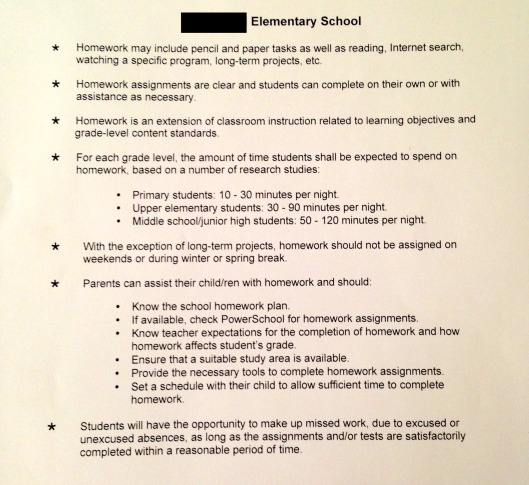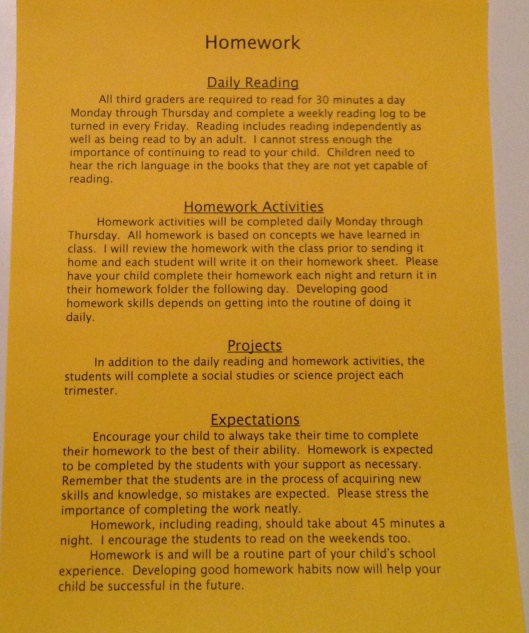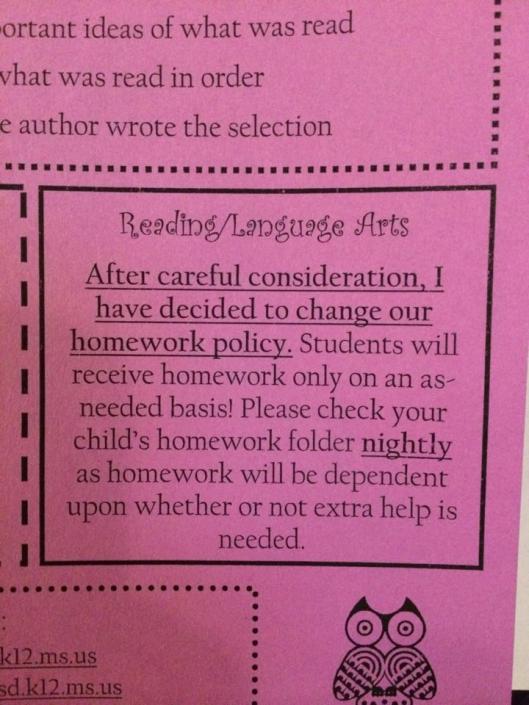My revolt against homework was busted wide open again this week when, at one of my kids’ parent-teacher conferences, the subject of homework came up and I stated, “Yes, well, we’re not fans of homework as a policy.” The teacher smiled and said, “Well, we have our requirements,” as she slid this across the table to me.

This actually is the same district homework policy that’s been in place for quite a while (I believe it was adopted in 2010). There were two things about this that especially interested me: first, the teacher’s use of the word “requirement,” which indicates to me that she is operating under the belief that she is required to assign 10 – 30 minutes of homework every night to her students, and that every student is thus required to do that much homework every night. The other thing is these words on the district handout: “based on a number of research studies.”
Not wanting to have a confrontation at the conference with my child sitting right there, I kept my mouth shut, but decided to take these questions to the Superintendent, which is pretty easy to do seeing that he has a Facebook page set up. I explained that I had received a copy of the district’s Homework Guidelines and would he be so kind as to share with me and all the other parents in the district what exact research studies the district’s guidelines are based on?
This was his response:
“These are the same guidelines that we have had. However, we have added in a piece that empowers a parent to sign off when your child has reached the guideline amount so that your child isn’t penalized if the homework is beyond the guideline amount. We have also added a sign off for parents in case their child truly doesn’t understand a concept. The parent is now able to sign off and their child’s grade won’t be penalized for this as well. This form is on the district website and your school’s website. We don’t want kids staying up late doing homework and now parents have a way to formerly communicate this to their child’s teacher. As to the studies, I did post a study to Facebook earlier about homework.”
I searched his Facebook page and was unable to find the studies he mentioned, so I asked again if he would kindly repost them. He responded with this:
“I just wanted to share a summary of research on homework. While any comments are appreciated, Please keep any comments more general in nature. Concerns should be addressed through other avenues. This is a topic we all have an opinion. Page 1, Note (Yellow): Robert Marzano is one of the leading researchers in education and has done a meta analysis of the research on homework. (A meta analysis is a summary of the results of many other studies.) While he cites some books that make a case against homework because of its impact on home life and the impact of too much homework, the research overwhelmingly suggest that the right kind of homework in the proper amount can have academic benefits. The benefits range from about 6 percentile points on a test to 31 percentile points. On a test that could be the difference between an A or B or even C. Page 2, Note (Yellow): This chart of several research studies show that the impact of homework on student achievement is between 8 and 31 percentile gains. If you were taking an exam an extra 31 percentile points on your test could be huge. However, research suggest those gains only come with teacher feedback such as comments or grading. Page 3, Note (Yellow): The case against homework is based on a few arguments such as that students from low- socioeconomic families may not have the proper supports at home to do the work. Additionally, if homework is not properly aligned to what students know, the impact on student engagement in learning can be detrimentally Affected. Homework that can’t be done independently is too difficult. Also, the authors against homework often cite the impact on family activities. Too much homework can impact family time. Page 6, Note (Yellow): What is too much time on homework? While each family might have a different answer, research suggests that homework is optimal at about 10 – 15 minutes multiplied by the student’s grade level as it relates to student achievement. In junior high that may mean from one hour to two hours a night. Page 6, Note (Yellow): While homework policies are important at a district level, research suggests that homework given strictly to meet a policy guideline does not positively impact student achievement. Rather student homework that is carefully crafted by the teacher to meet a specific learning goal will have the best result. A teacher should have discretion about when homework makes sense and not simply bound by policy- at least that is what research suggests. — http://www.marzanoresearch.com/documents/GSASR_HomeworkArticle.pdf”
I should note that the link at the end of his response doesn’t work, but as it seems that this guy, Marzano, seems to be behind the district’s position on homework, it was easy enough to Google him, and I’ll come back to that in a minute.
This part stood out to me: “A teacher should have discretion about when homework makes sense and not simply bound by policy . . .” And yet, so very many teachers at my kids’ school operate under a very different belief – a belief that they are mandated to assign homework (in a one-size fits all manner), and that students are therefore mandated to do said homework – as a matter of policy.
Back to Robert Marzano. I had never heard of him. So I Googled him, and apparently he’s a really big name in the education industry. Yes, I say industry, because this guy has apparently made his fortune (and still is) by selling his professional development products and services to educators and school districts around the country. If our district is hanging its hat on what this guy says and sells, I hope they are aware that Marzano has plenty of critics. All you have to do is Google “Robert Marzano criticism” and you come up with numerous articles that take apart Marzano’s methods and conclusions, piece by piece, and some call him a downright fraud.
I also sent an email to the person who heads up “Educational Services” in our district; I was told that her committee actually came up with the district’s Homework Guidelines. I wanted to find out from this person what the “research studies” were on which the Guidelines are based. I received this response:
Dear Ms. Morguess,
Thank you for your email and request. The committee met in 2010 and read many pieces of research about the pros and cons of Homework. This district is not prepared to do away with all homework across the board, at this point in time. Rather, homework guidelines were produced to better define what types of homework are value-added to student learning, based on the readings. The common thread amongst the pros of homework is that it is meaningful to the student and relates to current class learning as well as can be practiced independently within a reasonable amount of time. The main research articles, which support the guidelines are (and Superintendent Pletka also sent a more recent article from the Marzano Research Laboratory):
“Homework Research and Policy: A Review of Literature.” (March 2000)
Harris Cooper
http://today.duke.edu/2006/03/homework.html
“How Important Is Homework,” a summary of the
U.S. Department of Education’s stance on the issue
http://www.kidsource.com/kidsource/content/how_important_homework.html
Educational Leadership March 2007
Special Topic / The Case For and Against Homework
Robert J. Marzano and Debra J. Pickering
http://www.ascd.org/publications/educational-leadership/mar07/vol64/num06/The-Case-For-and-Against-Homework.aspx
For any student, if homework becomes excessive or a struggle, contact the teacher to discuss the appropriateness of assignments given. There is a new homework parent communication form posted on school or teacher webpages that can be attached to the assignment, finished or unfinished, to explain the problematic situation and to request a phone or in-person conference with the teacher for further discussion and resolution.
I noted that nothing she sent me was an actual “research study,” but rather, a few articles which discussed studies. Further, nothing in any of the articles she sent me support the time guidelines for homework that our district has adopted. They all reference the “10-minute rule” which suggests a limit of ten minutes of homework daily per grade level – which is a far cry from the “120 minutes” the district seems to think is okay for middle-schoolers (keep in mind, these are twelve- and thirteen-year olds we’re talking about, and in our district they are in school for a solid seven hours every day, and they’re then expected to go home and do up to two hours of homework; that’s a nine-hour day – more than a typical adult work day. Why is this okay?). Dr. Harris Cooper, probably the most prominent homework researchers out there, and one she references, clearly states that after ninety minutes of homework for a middle schooler, the effects become negative. Dr. Cooper has also said that there is little to no value in homework for elementary school students.
I think the Superintendent got tired of my bothering him on his Facebook page, so he asked the principal of my kids’ elementary school to give me a call and have a little chat with me. Imagine my surprise when I discovered two voice-mail messages from the principal (one on our home phone, and one on my cell phone – this must be serious!). I actually had butterflies in my stomach as I dialed the school back, not knowing what he wanted to talk to me about.
We ended up having a nice chat, the principal and me. He said he was calling at the Superintendent’s suggestion, as he understood I had “some concerns about homework.” I laughed. “This is nothing new,” I told him. “I’ve been fighting this battle for two years, as you well know.” He chuckled. So I explained to him my concerns about the fact that while the Superintendent says that homework is not supposed to be assigned just for the sake of assigning homework, as a matter of policy, that that is exactly what most teachers continue to do. I relayed to him the exchange with the teacher at my daughter’s conference about the homework “requirements.” I rehashed all the concerns and doubts about homework that I’ve been expressing vocally and openly for two years now. He said he agreed with a lot of what I said. He asked me what it is I want to see – doing away with homework altogether? Well . . . yes, ideally. Yes! Why is this seen as such a crazy idea? I mean, it’s not a given that every employee will have to bring work home. Why is it a given that every student will – needs to – bring work home? Why is that the default, and anything different is seen as wildly unrealistic? I told him, that yes, ideally, I would like to see homework done away with, but if we’re going to keep homework around as a matter of policy, then what I’d like to see is homework on an as-needed basis, and in reasonable, realistically manageable amounts. He agreed that in an ideal world, every teacher would be able to gauge where each student is and which might benefit from extra review or practice at home, and which really don’t need that, or need something different, like more specialized instruction in the classroom. But, he said, that’s just not realistic in today’s landscape of classrooms with 35 students.So, classes are overcrowded (but our district has had a commercial produced and which runs on local cable channels trying to attract families), and teachers are just unable to meet students where they are (even though said commercial produced by the district says that our district meets students where they are), so a one-size fits all manner of teaching is employed, and everyone is expected to go along with it, and parents are expected to pick up the slack.Sigh.But hey! Our district has created a form that parents can now utilize to sign their kids off on homework after they’ve put in the required time, so that the kids aren’t penalized if they were unable to complete their homework! The Superintendent told me that this is a way that the district is now “empowering” parents. Yes, he said “empowering.” Of course, the form is buried on the district website – nobody will ever find it unless someone tells them about it (teachers certainly aren’t mentioning it to parents), and then you have to hunt for it. But, gosh. I guess we should just be thankful that the district is “empowering” us to have a tiny bit of say over what goes on in our own homes.




